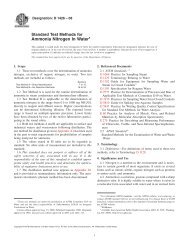Bad Astronomy: Misconceptions and Misuses Revealed, from ...
Bad Astronomy: Misconceptions and Misuses Revealed, from ...
Bad Astronomy: Misconceptions and Misuses Revealed, from ...
You also want an ePaper? Increase the reach of your titles
YUMPU automatically turns print PDFs into web optimized ePapers that Google loves.
238 BEAM ME UP<br />
out quickly, <strong>and</strong> so numbers are used after that. John Flamsteed<br />
was a seventeenth-century astronomer who catalogued thous<strong>and</strong>s<br />
of stars, <strong>and</strong> many still bear his name. Over 300,000 fainter ones<br />
are listed in the German Bonner Durchmusterung catalog <strong>and</strong> bear<br />
the initials “BD” before a number representing their coordinates.<br />
Thous<strong>and</strong>s of stars are in the Henry Draper catalog, named in<br />
honor of an astronomer who was among the first to use the new<br />
tool of spectroscopy in the 1870s (<strong>and</strong> who also took the first photograph<br />
of the Orion Nebula, 84 years to the day before I was<br />
born). These stars have the letters “HD” in front of a number representing<br />
their position on the sky.<br />
Many stars are loaded down with a half-dozen or more obscure<br />
designations. Only a very rare few are named after individuals; van<br />
Maanen’s star or Barnard’s star are examples of those. These typically<br />
are special stars, like ones that are particularly close by or that<br />
have an unusually high velocity through the Galaxy. They’re usually<br />
named after the astronomer who discovered their unusual properties.<br />
One star, Cor Coroli, is an exception—it’s named after the<br />
heart of King Charles II, who patronized astronomy in the 1600s.<br />
Not all of us are so lucky. Getting a star named after you is a<br />
very rare event.<br />
Of course, the companies trying to sell stars would have you believe<br />
differently. You, too, can be immortalized in the heavens . . .<br />
if you believe their ads. Some are interesting indeed, claiming that<br />
astronomers will actually use the name you choose for the star. I’ll<br />
let you in on a secret, as an astronomer: we don’t. Many of us<br />
aren’t particularly fond of the alphabet-soup names we use, but it’s<br />
better than using the name “John Q. Public,” <strong>and</strong> we don’t have to<br />
change what we call a star because some company phones us to<br />
say that someone new has signed up for their “service.”<br />
The bottom line is, despite any claims by these companies, the<br />
name you give a star is just that: a name you give it. It isn’t official<br />
<strong>and</strong> has no validity within the scientific community.<br />
Now really, if all you care about is sending a unique gift to<br />
someone, <strong>and</strong> you like the fancy certificate, that’s fine. But in their<br />
ads, many of these companies don’t go out of their way to say that
















